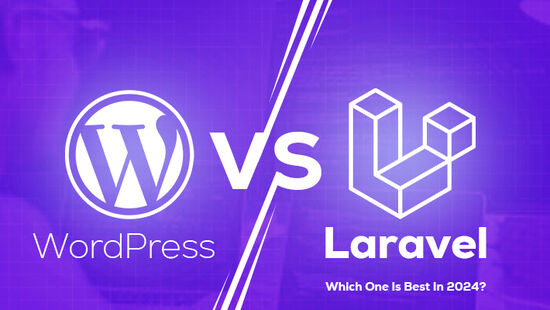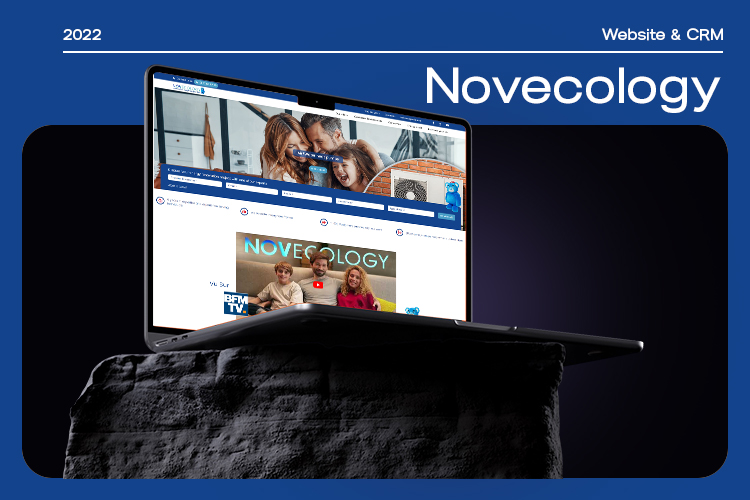Having a strong online presence is no longer a luxury. It's now a necessity to make your business thrive. Building the perfect website can propel your business to new heights while giving you recognition. But one crucial decision can leave you feeling like your brain's in a coding knot. That would be the nitty-gritty of choosing the perfect web development framework. This is where the two strongest contenders enter the chat- Laravel, the shining sword of complex web applications. Or WordPress, the user-friendly content management system (CMS). Which one should you choose in 2024 to conquer the digital realm? Fear not! In this article, we’ll talk about WordPress vs Laravel, discuss their differences, and nudge you in the right direction for your upcoming project.
WordPress VS Laravel: Overview
Before we begin a head-to-head comparison, let’s take a look at this quick overview of WordPress and Laravel.
Laravel
Laravel is like a pre-made building kit for web applications. It’s an open-source PHP web framework that has built-in tools to help make websites faster and reduce bugs. Taylor Otwell created Laravel in 2011 to simplify the website-making process while following the model–view–architectural controller pattern. It is one of the most popular and finest PHP frameworks with refined syntax, extensive learning resources, and a dedicated community. If you are asking “Is Laravel good for e-commerce?” then assuredly you can go for it.
Laravel developers are very high in demand as nearly 78.9% of websites use PHP for behind-the-scenes work. Moreover, it established itself as a notable player in the open-source PHP framework scene with an 8% market share in 2015.
Laravel Architecture:
Laravel is best for creating spontaneous websites because of its well-structured approach. It uses an architectural pattern called the Model-View-Controller (MVC) framework and separates the application logic into three layers. They are
🌟 Model: This deals with the database and business logic of your application.
🌟 View: What the user sees on the web browser.
🌟 Controller: Connects the Model and View while acting like the central nervous system of your application. It receives user requests like clicking a button or submitting a form.
The setup helps streamline the app a lot easier. This solution is compelling and suitable for any kind of web project, no matter small blogs or complicated websites.
Key Features
🌟 A Built-in Object-Relational Mapper (ORM) called Eloquent simplifies data access and manipulation.
🌟 A robust routing system.
🌟 Artisan console tool that generates codes and saves you valuable time.
🌟 Laravel uses a templating engine named Blade which helps you create web pages quickly. It combines PHP code with HTML and lets developers fix it effortlessly.
🌟 It focuses on top-notch security that protects websites from hacking, SQL injection, Cross-site request forgeries (CSRF), and cross-site scripting (XSS).
What it's good for:
🌟 Complex web applications
🌟 Scalable e-commerce development with features like shopping carts, payment gateways, and user accounts.
🌟 Social media platforms
🌟 Custom content management systems (CMS)
🌟 Real-time applications such as chat applications or live dashboards.
🌟 API development
🌟 Task scheduling and automation
WordPress
For our discussion of WordPress vs Laravel, knowing what WordPress is can help you understand if you want it or not. WordPress is an open-source, free-to-use platform for building websites and blogs. It is written in PHP and uses a MySQL database for storing content. The solution debuted in 2003 mainly for blogs. But now it powers over 40% of websites worldwide for its simple and no-experience-required web creation.
WordPress Architecture
WordPress has a user-friendly interface and the architecture is based on many plugins. It utilizes a modular architecture with the core software that handles user management or content creation. Themes (free and paid) control the website's look and there are templates to use. The Plugins extend functionality by adding features like contact forms or e-commerce capabilities. There’s a media library that stores uploaded images and videos. This layer between core, themes, and plugins allows you to get easy updates, customization, and scalability for growing websites.
Key Features
🌟 Easy to use content management with posts and pages, media management, history tracking, and scheduling.
🌟 A library full of free and paid themes for diverse styles and functionalities.
🌟 Exceptional Plugins like Yoast SEO.
🌟 Multilingual facilities.
What it's good for:
🌟 Personal blogs
🌟 Small business website
🌟Online portfolios
🌟 E-commerce stores (with plugins)
WordPress VS Laravel: Which Is Right for Your Project?
The major difference between Laravel and WordPress is that Laravel is a framework that developers use to create web apps or websites from the ground up. Where WordPress is a content management system that can kickstart your website-making experience. But if both are for making a website, then what should you choose for your next venture? Let’s take a look at this quick comparison table first and then do extensive research to learn further.
WordPress may shine while creating simple websites for blogs or portfolios. However, if you want customized and complex web applications Laravel is the way to go. Nonetheless, learning how to make e-commerce websites in Laravel can seem a little complicated. We would suggest you look for the best web developers, such as Dgtalspace, and let them help you bring your vision to reality.
Now it probably looks like both are good for different uses. To resolve this, let’s put the two sides together and see what they do.
Performance
Laravel vs WordPress performance comparison is crucial before you choose the right one. Because it influences your website's overall potential.
Laravel is pretty famous for doing extraordinary performances. The core code base is written perfectly and it’s optimized by some world-class PHP developers. It has some advanced features like catching, database indexing, and routing. Laravel offers more control over database interactions as well and handles any kind of application.
WordPress offers typical performance cause themes and plugins that can generate a lot of database queries. This will lead to a slowing down performance. WP Engine conducted a study by comparing a basic website built on both platforms. While the initial load time was similar, Laravel showed faster response times for subsequent page loads.
So, WordPress may shine in creating simple websites for blogs or portfolios. However, if you want customized and complex web applications Laravel is the way to go.
Scalability
Scalability becomes paramount when your project takes off and your website experiences significant growth. Laravel easily handles it by distributing the application workload across multiple servers for increased capacity. The queuing system handles long-running tasks asynchronously and gives a great user experience. Database systems like MySQL and PostgreSQL allow you to choose the one that scales best for your needs.
Conversely, WordPress relies heavily on plugins for scaling functionalities like caching and database optimization. The whole scaling process would need careful selection and configuration. But they’ll only add complexity and ongoing maintenance needs.
So if your website is aiming for high traffic demands then Laravel remains superior in terms of scalability.
Speed
If we consider Laravel vs WordPress speed then Laravel excels a little more. The Eloquent Object-Relational Mapper (ORM) makes it super fast compared to WordPress. The Plugins and the procedural code can make WordPress work slower.
Security And Maintenance
Laravel offers a more secure environment than WebPress. It has built-in security features, framework updates, and a focus on secure coding practices by developers. Whereas, WordPress relies only on software updates and security plugins to stay protected. This means there's a greater window of vulnerability that can happen between those updates. Hackers can easily exploit it and even frequently hack the website. According to Sucuri’s SiteCheck scans in 2022, 4.3% of WordPress websites were infected with malware. That translates to roughly 1 in every 25 websites being compromised!
Database Management
Laravel uses ORM like Eloquent and provides a cleaner way to interact with the database. Developers can write expressive and maintainable code for CRUD (Create, Read, Update, Delete) operations with the database tables represented by Eloquent. Wordpress on the other hand uses procedural code which can be less intuitive and potentially lead to inefficiencies.
Search Engine Optimization
As WordPress itself is a CMS, it comes with built-in features like permalinks, meta tags, and category structures that can be easily customized for better SEO. Laravel comes a little short in this case. Because it is a framework and not a CMS. It offers minimal SEO functionalities out of the box but has the flexibility to implement SEO with customization and third-party libraries.
Cost Effectiveness
The cost-effectiveness is a major consideration when comparing WordPress vs Laravel. WordPress is pretty cost-effective for small blogs or moderate-sized websites. There are many free features but premium themes or plugins will cost you with your growing audience. Laravel is indeed a free and open-source framework. However, the development cost can be higher due to the need for custom coding. Note that, it would be cost-effective in the long run as Laravel would provide an efficient solution for your ever-growing business.
Want a more budget-friendly solution? Look no further than Dgtalspace’s web development service. Trust us, it’s an investment you won’t regret.
Popularity
Both of our contendents are highly popular. Regardless to say, Laravel can accomplish everything WordPress can. But WordPress being only a CMS can’t do everything like Laravel. Nevertheless, Laravel is becoming more popular according to Google trends in recent years.
WordPress VS Laravel: The Final Verdict
There is no clear winner as both platforms offer great initiatives for distinct applications. Choose Laravel for your app development (small or complex), or highly customized and intricate web application. And if you need a simple website, blog, or portfolio then go for WordPress. Ultimately, the decision is only yours.
Conclusion
Choosing the right platform for building a website can feel like going through an impossible maze! WordPress vs. Laravel presents a compelling showdown, each offering unique strengths. But your choice depends on your specific requirements. Consider your needs, budget, and target audience carefully, and you are good to go. May your project compile without errors and run like a dream!
FAQs
How to create an e-commerce website in Laravel?
Creating a website in Laravel needs a steeper learning curve. We would strongly suggest getting help from a Laravel developer and letting them work their magic!
Can Laravel and WordPress Be Used Together?
Yes, the fun part is both the rivals work great together. They can be a powerful duo for building websites. You can install WordPress in the same database that is used by Laravel. With WordPress you can create a user-friendly frontpage with their library full of themes. And let Laravel tackle the complex features behind the scenes. They’ll share the same database and keep things organized.
Our Latest Works
Novecology
Leading Energy Solutions website
School Bell
Online Tutoring Portal
ArmenianAd.com
Premium Directory and Classified Ads Platform






Comments:
Adrian Fernandez says: Jun 01, 2024
Detailed discussion. Very well written !!!